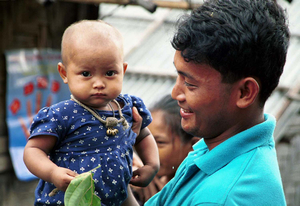How a Cholera Research Lab Advanced Immunization
|

I grew up in an educated middle class Bangladeshi family in Dhaka, the capital of the country. I grew up with the idea that immunization is not important, that vaccines could have an adverse effect on vital organs of your body. Having a strong immune system without intervention was more desired. My siblings and I never could tell if we had received routine vaccines during our childhood or not. My elder siblings could confirm receiving the vaccine against tuberculosis from school, because it left marks on their body. I remember my father not being so happy about it.
Almost thirty years after, when my nephews were born, I saw a big change in my father's attitude. I observed a growing awareness among young and elder mums in my family and neighborhood, too, irrespective of socioeconomic background. I observed my sister-in-law taking my nephews to receive polio vaccines on National Immunization Day (NID). In one instance, my cousin's wife took my six-month old nephew to the nearest NID camp since his mother was at work. Most surprisingly, my father didn't oppose it; he was more at ease, which was certainly a big change of attitude.
A final result of this massive change in attitude came when the World Health Organization declared Bangladesh as polio-free, along with ten other countries in WHO's South East Asia region, on 3 May 2014.
A study published in the journal of Health Policy and Planning (1997) assessed the impact of the first two National Immunization Days in terms of immunization coverage and change in knowledge among women living Dhaka city. NIDs educated women, both slum and non-slum dwellers, about the prevention of polio through vaccination.
The drive to eradicate polio from Bangladesh required participation from the civil society, media, development partners, and the Government of Bangladesh. One of the key players of this joint effort is the International Centre for Diarrheal Disease, Bangladesh (icddr,b), an international organization based in Dhaka and known globally for its excellence in public health research. In 2013, icddr,b joined forces with scientists and health experts from 80 countries around the world to ratify a comprehensive new strategy to secure a lasting polio-free world by 2018.
icddr,b was established as a cholera research laboratory in 1960. icddr,b's journey in the world of cholera and enteric diseases is commanding, as it gave the world the simplest solution to treat diarrheal disease: Oral Rehydration Solution (ORS). Till today, the discovery has saved an estimated 50 million lives worldwide, the majority of whom are children under five.
icddr,b's fight against cholera and diarrhea continued and yielded another groundbreaking discovery that zinc, when taken with ORS, further reduces fatality rates from diarrhea. It also reduces duration, severity, and the likelihood of hospitalization during diarrheal episodes. As with ORS, Bangladesh was the first country to implement a national scale-up programme for ORS-zinc combination therapy.
Achievements as such these have earned icddr,b national and international recognition. While icddr,b is based in Dhaka, it addresses many urban and rural health challenges that affect not only Bangladesh but many other low-income countries in the world. Over time, icddr,b has expanded its initial research on diarrheal and enteric diseases to include other developing priorities to address health challenges worldwide—with a focus on children. The fight against polio in the region, for example, has been significantly boosted through the commitment of iccdr,b's highly qualified and diverse group of researchers and scientists.
In addition to its research expertise, Bangladesh deploys one of the largest cohort of female health care volunteers in the world. icddr,b is one of the leading organizations who started recruiting female volunteers, starting in the 1970s. These volunteers are trusted members of the community who have been providing primary care and services regarding immunization, family planning, and maternal and child care. Many of the volunteers have been working for more than two decades. These volunteers are providing immunization support through icddr,b's hospital and sub-centres located in Matlab.
Through important research at icddr,b, the education of communities by health care volunteers, and the commitment of many partners including national government, attitudes about immunization among skeptics like my father have made a lifesaving turnaround in my country.
Photo credit: M.Dorgabekova














